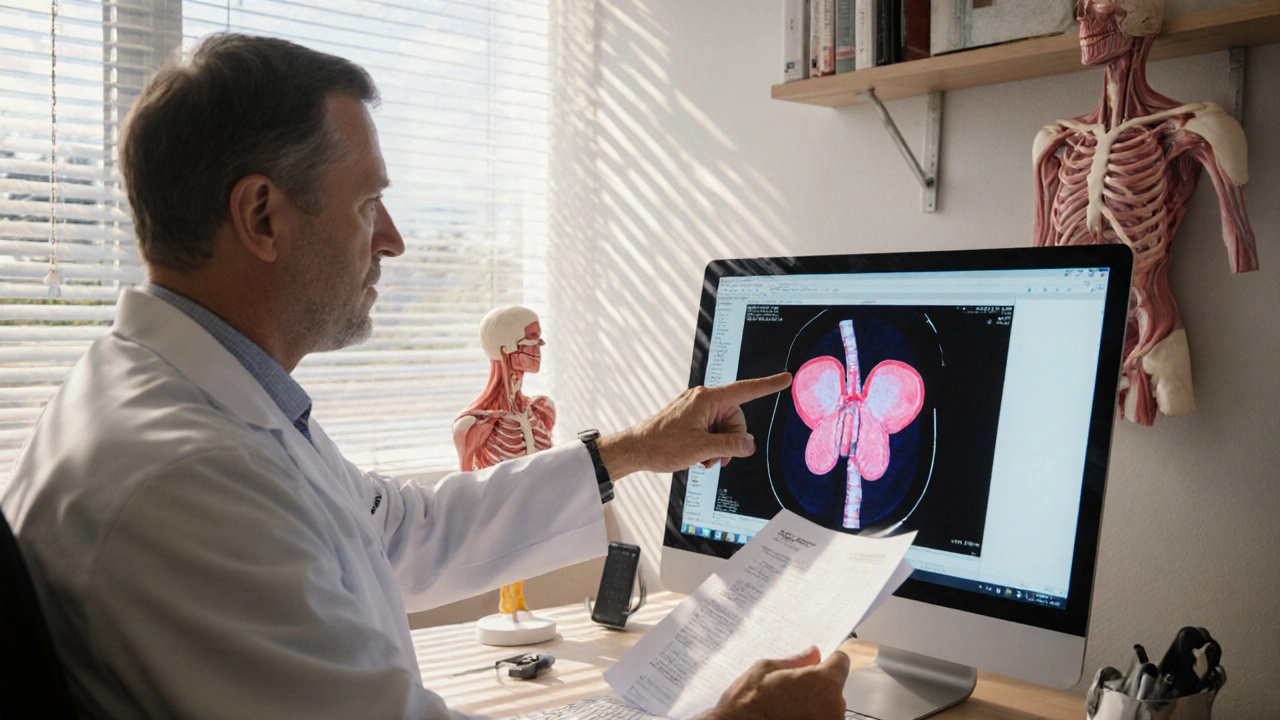Hyperthyroidism Symptom Checker for Men
This tool helps identify potential symptoms of hyperthyroidism in men. Select all symptoms you have experienced in the past month.
Ever felt your heart racing for no reason, or noticed sudden weight loss even though you weren’t cutting calories? Those could be signs of hyperthyroidism in men. While thyroid disorders are often linked to women, men experience them too - and the signals can be easy to miss.
TL;DR - Quick Takeaways
- Hyperthyroidism means the thyroid makes too much hormone, speeding up metabolism.
- Typical male symptoms: rapid heartbeat, unexplained weight loss, heat intolerance, tremor, and mood swings.
- Diagnosis relies on blood tests (TSH, Free T4) and sometimes imaging.
- First‑line treatments: beta‑blockers for symptoms, antithyroid meds (e.g., methimazole), radioactive iodine, or surgery.
- Long‑term monitoring is crucial; most men regain normal thyroid balance with proper care.
What Exactly Is Hyperthyroidism?
Hyperthyroidism is a condition where the thyroid gland produces excess thyroid hormone, causing the body's metabolism to accelerate. Think of the thyroid as a tiny engine in the neck that regulates how fast your body burns fuel. When it revs too high, everything else speeds up - from heart rate to how quickly you feel hungry.
Why Men Often Overlook It
Men tend to ignore subtle health changes, and the classic textbook picture of thyroid disease features women with fatigue and cold intolerance. In reality, men may present with more "manly" signs like muscle weakness, irritability, or a persistent sense of heat. Because these symptoms can be brushed off as stress or over‑training, a diagnosis is sometimes delayed.
Key Symptoms to Watch For
Symptoms can vary, but most men notice a mix of the following:
- Palpitations or a racing heart (often >100bpm at rest)
- Sudden, unintentional weight loss - sometimes 5‑10lb in weeks
- Heat intolerance - sweating even in cool rooms
- Tremor in the hands, especially when extending fingers
- Increased appetite that doesn’t stop the weight drop
- Muscle weakness, particularly in the upper arms and thighs
- Sleep disturbances - insomnia or frequent waking
- Elevated anxiety, irritability, or mood swings
- Frequent bowel movements or diarrhea
If you spot three or more of these, it’s time to get checked.

How Doctors Diagnose the Issue
The diagnostic journey is straightforward but requires a few key tests.
- Blood work: The first blood test measures TSH (thyroid‑stimulating hormone). In hyperthyroidism, TSH is usually suppressed (below 0.4mIU/L). The next test looks at Free T4 (the active thyroid hormone available in the bloodstream). Elevated Free T4 confirms excess hormone production.
- Thyroid antibodies: If the cause might be autoimmune (most common is Graves' disease (an autoimmune disorder where antibodies stimulate the thyroid)), doctors check for TSI (thyroid‑stimulating immunoglobulin) or TPO antibodies.
- Imaging when needed: A thyroid scan or ultrasound helps identify nodules, goiter size, or uptake patterns. Radioactive iodine uptake (RAIU) tests are especially useful to differentiate Graves'vstoxic nodular goiter.
With these data, the endocrinologist can pinpoint the type and severity of hyperthyroidism.
Treatment Options - What Works Best for Men
There isn’t a one‑size‑fits‑all answer. Treatment choice depends on age, severity, underlying cause, lifestyle, and personal preferences.
| Treatment | Mechanism | Typical Duration | Pros | Cons |
|---|---|---|---|---|
| Beta‑blocker (symptom‑relief medication) | Blocks adrenaline effects, reducing heart rate and tremor | Weeks to months (often temporary) | Fast relief, easy oral dosing | Doesn't treat hormone excess, may cause fatigue |
| Methimazole (antithyroid medication) | Inhibits thyroid hormone synthesis | 6‑18months, sometimes lifelong | Non‑invasive, can normalize hormone levels | Risk of liver issues, rare agranulocytosis |
| Radioactive iodine therapy | Destroys overactive thyroid cells | Single dose, effect over 3‑6months | High cure rate, avoids surgery | May lead to permanent hypothyroidism, not for pregnancy |
| Surgical removal (thyroidectomy) | Physically removes part or all of the gland | One‑time procedure, recovery 2‑4weeks | Immediate control, useful for large goiters | Risks of vocal cord damage, need for lifelong hormone replacement |
Most men start with a beta‑blocker like Propranolol (a non‑selective beta‑blocker) for rapid symptom control, then transition to the longer‑term option that best fits their situation.
Choosing the Right Path for You
Here’s a quick decision guide:
- Young, active men - Antithyroid meds keep you on the field without surgery downtime.
- Men with large goiters or compressive symptoms - Surgery often gives immediate relief.
- Those planning families - Methimazole is safer than radioactive iodine, which can affect future pregnancies.
- People preferring a “once‑and‑done” approach - Radioactive iodine is appealing, but be ready for potential lifelong thyroid hormone pills.
Consult your endocrinologist, discuss lifestyle goals, and weigh the pros and cons listed in the table above.
Living With Hyperthyroidism - Tips for Daily Management
Even after treatment kicks in, a few habits help keep symptoms in check:
- Monitor heart rate: Use a smartwatch to catch unexpected spikes.
- Stay hydrated: Excess sweating can deplete electrolytes.
- Balance nutrition: Aim for a diet rich in calcium and vitamin D - hyperthyroidism can thin bones.
- Regular blood tests: Every 4‑6weeks initially, then every 6‑12months once stable.
- Stress management: Meditation or short walks reduce cortisol, which can otherwise aggravate thyroid imbalance.
Remember, many men feel fully restored after treatment. Your job is to stay proactive and keep an eye on any changes.
Frequently Asked Questions
Can hyperthyroidism cause infertility in men?
Yes, excess thyroid hormone can lower testosterone and affect sperm quality. Proper treatment usually restores fertility within a few months.
Is it safe to exercise while my thyroid is overactive?
Mild to moderate exercise is fine, but high‑intensity workouts may exacerbate palpitations. Start slow, monitor heart rate, and talk to your doctor before intense sessions.
How quickly do beta‑blockers relieve symptoms?
Most men feel calmer within 30‑60minutes of the first dose, with full effect in a day or two.
Will I need lifelong medication after radioactive iodine?
About 80% of patients become hypothyroid after the treatment, which means a daily synthetic hormone (levothyroxine) is required for life.
What’s the difference between Graves' disease and a toxic nodule?
Graves' is an autoimmune condition where antibodies AT the whole gland, while a toxic nodule is a single overactive spot that works on its own.
Whether you’ve just noticed a racing pulse or you’re managing a long‑standing diagnosis, understanding the landscape of hyperthyroidism in men empowers you to take charge. Armed with the right tests, an individualized treatment plan, and everyday habits, you can bring your metabolism back to a comfortable speed.




Courtney Payton, September 29, 2025
It's disconcerting how many men brush off hyperthyroid symptoms as just "being stressed".
When a racing heart and unexplained weight loss are dismissed, the real danger lurks beneath the surface.
We owe ourselves the duty to seek proper testing before letting our bodies self‑destruct.
Ignoring the medical facts is a silent betrayal of one's own health.
Take the advice seriously, get those blood panels, and stop pretending you're invincible.
Muthukumaran Ramalingam, October 1, 2025
Man, I read that whole guide and felt like it was trying to sell me a miracle pill.
The list of symptoms reads like a cheat sheet for any guy who's feeling a bit off.
Sure, rapid heartbeat and weight loss can be caused by a bunch of stuff, not just thyroid issues.
But the way they lay out the blood tests makes it sound like a simple checkbox exercise.
I guess if you already have a doctor you won't need all that hype.
Still, the table with treatments is pretty handy if you're clueless.
Just remember, radioactive iodine is not a joke – it can lock you into lifelong meds.
Bottom line: stay chill, get tested, and don't jump on the first treatment they offer.
joba alex, October 4, 2025
While the article paints hyperthyroidism as a straightforward endocrine mishap, the underlying immunological cascade is anything but simple.
The emphasis on TSH suppression overlooks the nuanced role of TSH‑receptor antibodies in modulating peripheral deiodinase activity.
Moreover, the purported "symptom checker" reduces a complex clinical picture to a binary algorithm, which is scientifically questionable.
One must consider the differential diagnosis of pheochromocytoma or even factitious hyperthyroidism before committing to ablative therapy.
Thus, the recommended first‑line beta‑blockade, though useful for tachycardia, should not be conflated with disease-modifying intervention.
In practice, a multidisciplinary evaluation remains the gold standard.
Rene Lacey, October 6, 2025
We often think of the thyroid as a mere biochemical furnace, but philosophically it mirrors the very notion of balance in our existence.
When that equilibrium tips, the body broadcasts its distress through heartbeats, heat, and restless thoughts.
The guide rightly points out that men may ignore these signs, perhaps because masculinity traditionally denies vulnerability.
Yet the diagnostic pathway-TSH, Free T4, antibodies-offers an empirical way to confront the invisible turmoil.
Treatment choices, ranging from beta‑blockers to surgical resection, are decisions that intertwine medical prudence with personal values.
Choosing radioactive iodine, for instance, is a surrender to an irreversible metamorphosis, whereas antithyroid drugs demand patience and vigilance.
In this context, the patient's narrative becomes as vital as the lab values.
One might argue that the true cure lies not merely in hormone normalization but in the reclamation of agency over one's own physiology.
Thus, the guide serves as a map, but the traveler must decide the terrain he wishes to tread.
Ultimately, the pursuit of equilibrium reflects a deeper yearning for harmony within and without.
johnson mose, October 8, 2025
Hey folks, great rundown!
If you’re feeling that jittery pulse, grab a smartwatch and keep an eye on the numbers.
Hydration is key – those sweats can deplete electrolytes fast.
And remember, most men bounce back once they lock down the right treatment plan.
Stay cool, stay informed, and don’t let the thyroid run the show.
Charmaine De Castro, October 11, 2025
Just a quick tip: schedule your thyroid labs every 4‑6 weeks when you start therapy, then space them out as you stabilize.
Also, a calcium‑rich diet helps protect your bones, which can get thin with excess thyroid hormone.
Pair that with moderate exercise – yoga or walking can tame the anxiety spikes.
Feel free to drop a comment if you need more personalized advice!
Mark Mendoza, October 13, 2025
📌 Pro tip: Beta‑blockers give rapid relief for tachycardia, often within an hour. 😊
They don’t fix the hormone excess, but they buy you time while you sort out antithyroid meds.
Keep a symptom diary – note heart rate, mood, and any heat intolerance episodes.
Sharing that log with your endocrinologist makes the next appointment far more productive! 🚀
Dan Tourangeau, October 15, 2025
When checking labs, ensure the lab uses the same reference range each visit; otherwise you’ll misinterpret trends.
Also, flag any recent iodine contrast studies – they can temporarily skew results.
Clear communication with your provider avoids unnecessary dosage adjustments.
Bernard Valentinetti, October 18, 2025
Ah, the elegant dance of endocrine dysregulation; one might say it is a symphony of biochemical over‑activity! 🎻
Yet the article's table, while utilitarian, borders on the pedestrian in its presentation.
Consider, if you will, the nuanced pharmacodynamics of methimazole versus propylthiouracil – a discussion for the discerning mind.
And let us not ignore the existential weight of contemplating a lifetime of levothyroxine post‑radioiodine! 🌌
In short, choose wisely, dear reader, for your thyroid's fate is not a trivial footnote.
Kenneth Obukwelu, October 20, 2025
From a cultural lens, the stigma around men admitting they feel "off" is a silent barrier to early detection.
Bridging that gap requires community conversations that normalize thyroid health checks.
Sharing personal stories, like how a simple blood test uncovered an overactive gland, can inspire others to act.
Let's make the dialogue as vibrant as the metabolic fire we seek to balance.
Josephine hellen, October 22, 2025
First off, let me say that discovering you have hyperthyroidism is not the end of the world, it’s the beginning of a new chapter where you get to take charge of your health.
Imagine your body as a finely tuned orchestra; when one instrument-the thyroid-starts playing too fast, the whole symphony can feel chaotic, but with the right conductor (your doctor) you can bring everything back into harmony.
Step one is to acknowledge those early signs-racing heart, unexpected weight loss, heat intolerance-because they’re the body’s polite way of waving a red flag.
Step two is to get those blood tests done; a simple TSH and Free T4 draw can reveal the hidden imbalance you’ve been feeling.
Once confirmed, you have a menu of treatments, each with its own flavor, from beta‑blockers that calm the tempo to antithyroid meds that gently lower the production line.
Radioactive iodine may sound intimidating, but think of it as a targeted laser that trims the overactive cells, often resulting in long‑term stability.
Surgery, while more invasive, can be a swift solution for those with large goiters or compressive symptoms, and many patients bounce back remarkably well.
The key is open communication with your endocrinologist-share your lifestyle goals, whether you’re training for a marathon or planning a family, so they can tailor the plan to you.
Don’t forget the power of simple daily habits: staying hydrated, eating calcium‑rich foods, and getting enough sleep can all support your thyroid’s recovery journey.
Monitoring your heart rate with a smartwatch can give you real‑time feedback, helping you catch any unexpected spikes before they become uncomfortable.
Regular follow‑up labs every few weeks initially will track your progress and allow timely dose adjustments, keeping you on the right track.
Also, lean on your support network-friends, family, or online communities-because sharing experiences can turn uncertainty into empowerment.
Remember, many men have walked this path and emerged feeling stronger, more energized, and more in tune with their bodies.
Celebrate each small victory, whether it’s a calmer night’s sleep or a steadier heartbeat during a workout.
If anxieties surface, try gentle breathing exercises or short nature walks; they’re surprisingly effective at soothing the nervous system.
Above all, keep a positive outlook-you’ve got the knowledge, the resources, and the determination to steer your health back to the sweet spot.
Ria M, October 24, 2025
Oh, the drama of a heart that feels like a drum solo at a rock concert!
When the thyroid decides to crank up the metabolism, it’s like an unscripted thriller you didn’t sign up for.
But fear not, dear reader, because the medical world offers a cast of heroes: the steady beta‑blocker, the diligent antithyroid pill, the bold radioactive iodine.
Each character plays its part in taming the relentless tempo.
Just picture yourself stepping off the stage, breathing steady, after the curtain falls on that overactive gland.
Feel the applause of your own resilience as you reclaim control.
Michelle Tran, October 27, 2025
Totally feeling the vibe! 😂
Caleb Ferguson, October 29, 2025
You've nailed the roadmap-consistent labs and lifestyle tweaks truly make the difference, and aligning treatment with personal goals is the smartest play.
Delilah Jones, October 31, 2025
Exactly, and don't underestimate the power of a solid support circle; it turns a medical journey into a shared victory.
Pastor Ken Kook, November 3, 2025
All solid points here-keep tracking your symptoms, stay in touch with your doc, and remember to laugh when the thyroid tries to steal the show 😅.